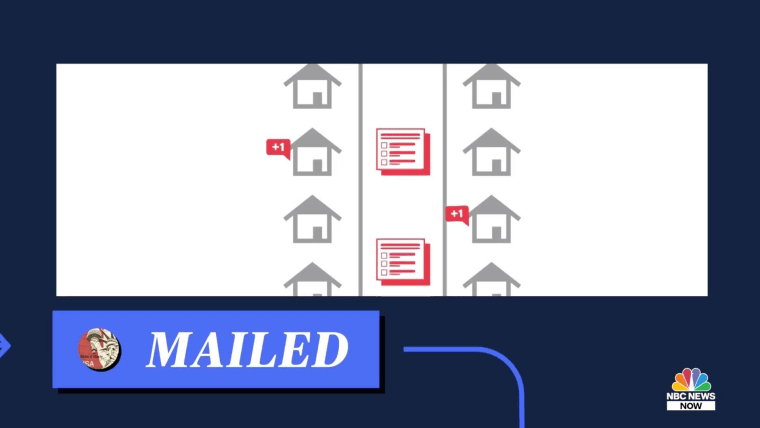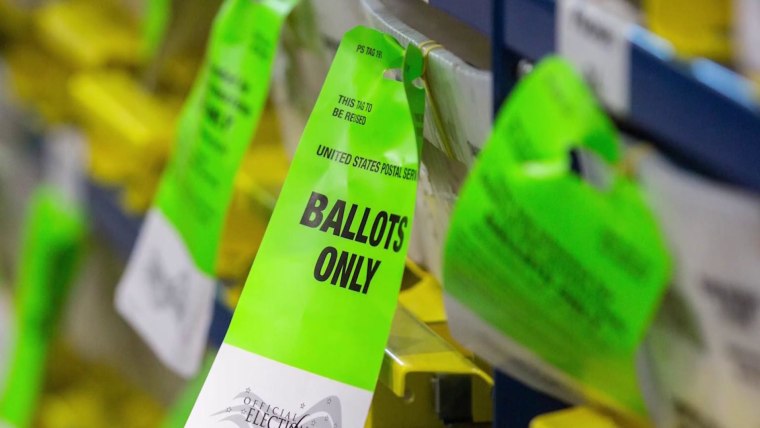With the presidential election looming and the coronavirus pandemic raging across the country, polls show strong support for allowing Americans to vote by mail or through drop-off boxes rather than go to the polls in person.
But there have been major delays in reporting results in several states holding primaries this year because of pandemic-related spikes in mailed-in ballots and state laws that don't allow processing of ballots to begin before Election Day. Pennsylvania took nearly two weeks to report its primary results, and New York, which held its primary June 23, has yet to declare winners in several races.
Voting experts say that eliminating such lengthy delays is essential to maintaining the public's trust in the integrity of elections and that states still have time to change their laws before Election Day, Nov. 3.
"When voters have to wait so long for results, it erodes trust in the process and leaves room for partisan bad actors to dispute the will of the people," said Amber McReynolds, CEO of the National Vote at Home Institute, a nonprofit organization.
Opposition to processing ballots early lies in concern that results could be released early and unfairly influence the outcome of the election, say experts, who say such fears are unfounded because there are numerous protocols to prevent premature reporting.
Michigan Senate Majority Leader Mike Shirkey, a Republican who opposed a bill in the Legislature that would have allowed early processing, told reporters in February that he thought it could set a "dangerous precedent" because it would allow the opportunity for early counting.
Ballot processing, experts say, is not the same as counting or tabulating a ballot.
"Allowing processing in advance means signature verification, the prep for counting by opening envelopes and flattening ballots to run through the scanning machine, prepping for the scanning, but they don't tally nor do they produce results," McReynolds said. "But they at least do all the work to make that happen, and that is really critical to getting timely results."
Signature verification and ballot tracking could also help ensure that ballots are filled out correctly. If that were allowed ahead of Election Day, elections officials would be able to notify voters if something needed to be fixed on their ballots to ensure they are counted, rather than rejected — which was a major issue in several state primaries.
Processing ballots before Election Day would make "a significant difference," said Wendy Underhill, director of the elections team of the National Conference of State Legislatures. "Americans are used to getting preliminary unofficial election results on Election Night. But depending on the processing plans in place, it could be days extra."
State processing timelines were determined decades ago, Underhill said, in places where just 3 percent to 5 percent of votes were absentee ballots. Now, because of the pandemic, states are seeing a huge influx of interest in mail-in ballots, which can be returned in the mail or dropped off in person by Election Day.
About 75 percent of voters in Kentucky's primary this year voted by mail, as did 50 percent in Pennsylvania. Both states widely offered the option to cast an absentee ballot without giving a reason for the first time.
The National Vote at Home Institute has been working with dozens of states to replicate successful mail-in ballot programs used in other states, rather than reinvent their election processes. McReynolds, a former director of elections in Denver, points to Colorado, where election officials begin processing ballots upon receipt, as the gold standard.
In Colorado, which had record turnout in its Democratic Senate primary this year, 99.3 percent of voters voted by mail or drop-off ballot boxes. More than half of the results were reported by the polls' closing time, and the race was called less than an hour later — largely because of election officials' ability to process ballots early.
Lawmakers in several states — including Ohio and battlegrounds Pennsylvania and Michigan — have introduced bills that would enable ballots to be processed before Nov. 3. Such early processing, advocates say, could prevent Election Day from becoming Election Week or Month if the presidential race is as close as it was in key states in 2016.
Pennsylvania and Michigan have the opportunity to alter their laws because their Legislatures meet year round. Many other states have shortened or altered their sessions because of the COVID-19 pandemic.
States could call special sessions to address ballot processing or enact rules by executive order. Kentucky Gov. Andy Beshear, a Democrat, issued an executive order during the July primary to allow earlier processing, but it applied only to that election. For the general election, the state has begun forming a bipartisan group that will help present recommendations to the secretary of state and the governor, said Jared Dearing, executive director of the State Board of Elections.
McReynolds said processing ballots early could save money.
"By not allowing states more days ahead of time, it's going to cost them a lot more money to process those ballots on and post-Election Day," McReynolds said, pointing to the potential need to hire more workers to process the expected unprecedented volume of mail-in ballots.
"No matter how you slice it, administrative backlog costs voters time and money," she said.
Download the NBC News app for breaking news and politics
Congress allocated $400 million to elections in the original coronavirus relief bill, which the Brennan Center for Justice at New York University Law School deemed insufficient — arguing that $4 billion would be needed in a future relief bill, especially after representatives from states like Iowa, Georgia and Kentucky testified at a U.S. Election Assistance Commission hearing in early July that they had already used a sizable percentage of the money during their primaries.
The House-passed HEROES Act includes $3.6 billion for states for "contingency planning, preparation, and resilience of elections for Federal office" with the expectation that they will use a large part for mail-in voting, while Senate Republicans and the White House are still negotiating the next coronavirus relief bill they hope to bring to the floor.
"want" - Google News
July 22, 2020 at 05:02PM
https://ift.tt/2WK3qLH
States want to speed the process for mail-in ballots - NBC News
"want" - Google News
https://ift.tt/31yeVa2
https://ift.tt/2YsHiXz
Bagikan Berita Ini


















0 Response to "States want to speed the process for mail-in ballots - NBC News"
Post a Comment